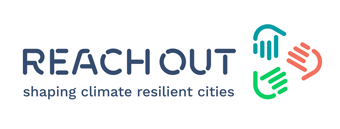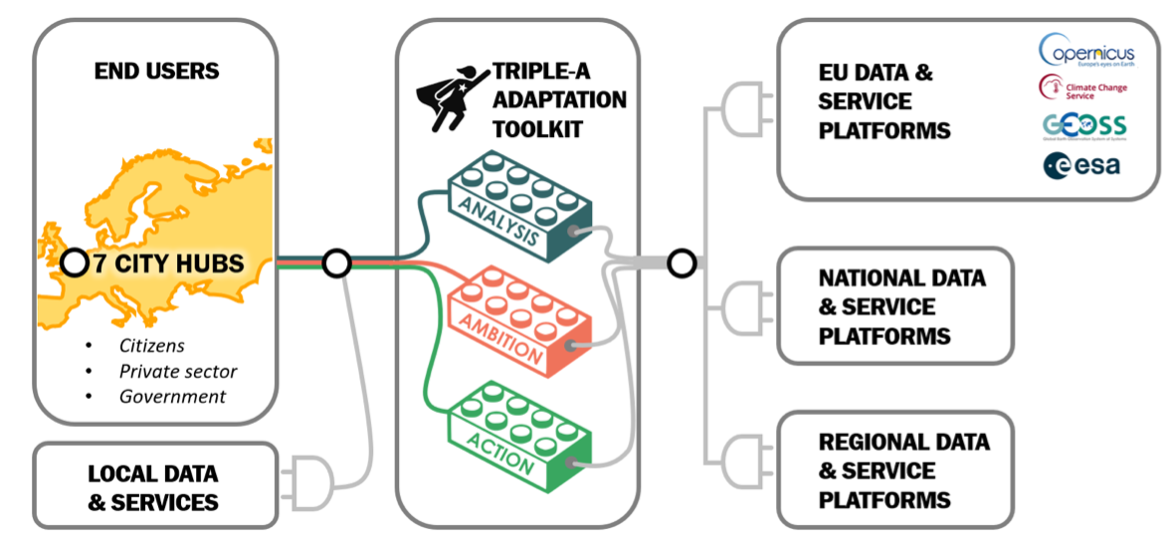
REACHOUT

- Title:
-
Resilience in Europe through Activating City Hubs Reaching out to Users with Triple-A Climate Adaptation Tools (Reachout)
- Start Date:
-
October 1st 2021
- End Date:
-
March 2024
- Funding Body:
-
Horizon 2020
- Coordinator:
-
Deltares (DEL), Netherlands; Climate Adaptation Services (CAS), Netherlands
- Research Partners:
-
Institute for Environmental Studies VU, Netherlands); Fondazione Centro Euro- Mediterraneo sui Cambiamenti Climatici (CMCC), Italy; Norwegian Geotechnical Institute (NGI), Norway; ECOLOGIC Institute (ECO), Germany; Fundacion Tecnalia Research & Innovation (TEC), Spain; Resilient Cities Network (R- Cities), Greece; SWECO group (SWE), Sweden/Netherlands; Sendzimir Foundation (SF), Poland; Cork City Council, Ireland; Municipality of Athens, Greece; Municipality of Lillestrøm, Norway; Municipality of Milan, Italy; Municipality of Logroño, Spain; Municipality of Gydnia, Poland; APG Asset Management, Netherlands; C40 Cities, Netherlands.
- Principal Investigators:
- Project Manager:
- Research Area:
-
Coastal and Marine Systems & Climate Change Adaptation
Introduction
According to the Global Centre of Adaptation, the formulation and implementation of climate adaptation plans in cities worldwide need to speed up rapidly to keep pace with projections of climate risks. To support this acceleration, more advanced and sophisticated climate services are required which represent the next level of climate services. Currently, multiple challenges remain to bridge the last mile in climate service delivery to cities across Europe despite considerable efforts in recent decades. The uptake of climate services by specific groups (particularly citizens and large parts of the private sector) is lagging. There also exist barriers to implementation and mainstreaming of climate services that prevent cities to move from understanding risk and vulnerabilities to adaptation action integrated into a wider context of climate resilient urban development. There is a need to improve the accessibility and relevance of climate services and increase engagement in adaptation planning and implementation of non-experts.
Aim
The primary aim of REACHOUT is to bridge the last mile in climate service delivery to better support all European cities in building resilience to climate change by a pragmatic approach that builds upon existing achievements and addresses main barriers for uptake.

Figure 1.1: Basic underlying layout structure of REACHOUT: providing demand driven localized services to City Hubs using robust open source tools connected to trusted open data platforms.
Work Packages
To achieve this, REACHOUT will build next level climate services that supports adaptation decision making in 7 City Hubs. These hubs serve as living labs for co-creation of the services with government, citizens and the private sector and serve as accelerators for further regional and national upscaling of the use of these services. The hubs represent a regionally diverse portfolio of climate vulnerabilities and adaptation needs across stakeholders. In each hub REACHOUT has a direct beneficiary partner that has already internalized adaptation planning and has strong institutional connections and relationships with other municipalities, towns and organizations in their periphery. This will support the upscaling of REACHOUT results.
The specific objectives of REACHOUT are:
- to support effective engagement of citizens and business in adaptation decision making in 7 City Hubs across Europe by co-development and testing of services and tools; through this co-development ownership with the end-users is created.
- to tailor these services to local policy contexts for each of these 7 hubs and support the integration of the services within the cities adaptation process and communication platforms using story maps;
- to innovate the Triple-A toolkit building upon ~20 existing proofed successful open source tools (figure 1.7) by effectively and flexibly connection with public data platforms at EU, national and regional scale and by allowing inclusion of local knowledge including the use of crowd sourcing;
- to recommend sustainable business and implementation models for the services employed in the hubs, based upon successful examples elsewhere. Also, key factors that drive the demand for services are defined;
- to upscale the use of the services to the wider City Hub network by organizing capacity building activities within the hubs. In this way 50+ fellow municipalities will be capacitated. In addition, through the Resilient Cities Network and C40 100+ cities will be informed;
- to create a supportive network of champions, service providers and platforms to sustain the services beyond the lifetime of the project;
- to build a robust evidence base providing successful examples of implementations of the Triple-A toolkit as well as scientific underpinning of what comprises an impactful service.
Contact
Name: Denise McCullagh
Email: ei.ccu@hgalluccm.esined




